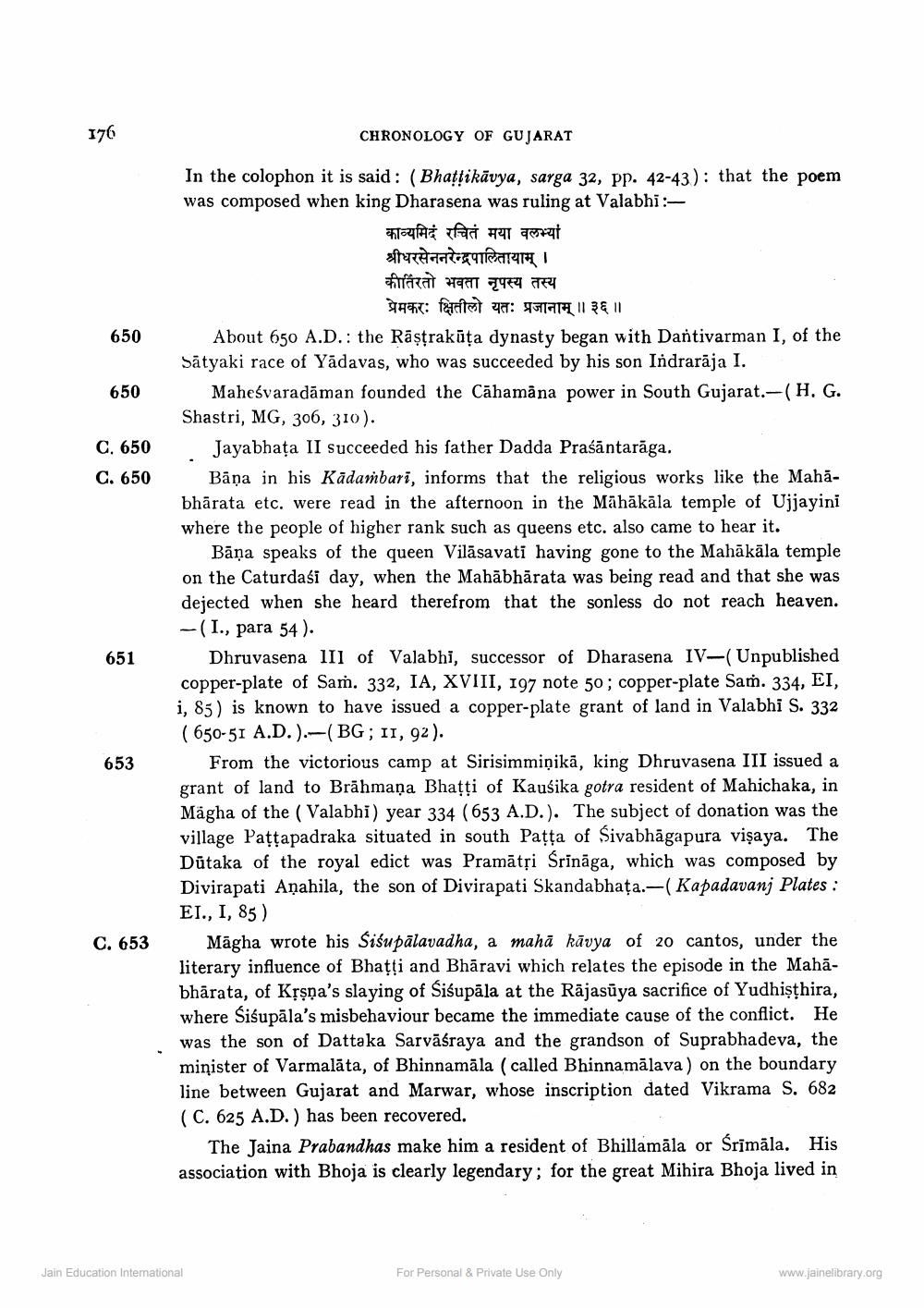________________
176
CHRONOLOGY OF GUJARAT
650
650
C. 650 C. 650
651
In the colophon it is said : (Bhattikāvya, sarga 32, pp. 42-43): that the poem was composed when king Dharasena was ruling at Valabhi:
काव्यमिदं रचितं मया वलभ्यां श्रीधरसेननरेन्द्रपालितायाम् । कीर्तिरतो भवता नृपस्य तस्य
प्रेमकरः क्षितीलो यतः प्रजानाम् ॥ ३६ ॥ About 650 A.D.: the Rāştrakūta dynasty began with Dantivarman I, of the Satyaki race of Yādavas, who was succeeded by his son Indrarāja I.
Maheśvaradāman founded the Cāhamāna power in South Gujarat.-(H. G. Shastri, MG, 306, 310).
Jayabhața II succeeded his father Dadda Praśāntarāga.
Bāņa in his Kādambari, informs that the religious works like the Mahabhārata etc. were read in the afternoon in the Māhākāla temple of Ujjayini where the people of higher rank such as queens etc. also came to hear it.
Bāņa speaks of the queen Vilāsavati having gone to the Mahākāla temple on the Caturdaši day, when the Mahābhārata was being read and that she was dejected when she heard therefrom that the sonless do not reach heaven. -(I., para 54).
Dhruvasena lIl of Valabhi, successor of Dharasena IV-(Unpublished copper-plate of Sam. 332, IA, XVIII, 197 note 50; copper-plate Sam. 334, EI, i, 85) is known to have issued a copper-plate grant of land in Valabhi S. 332 (650-51 A.D.).-(BG; II, 92).
From the victorious camp at Sirisimmiņikā, king Dhruvasena III issued a grant of land to Brāhmaṇa Bhatti of Kausika gotra resident of Mahichaka, in Mägha of the (Valabhi) year 334 (653 A.D.). The subject of donation was the village Pattapadraka situated in south Pațţa of Sivabhāgapura vişaya. The Dūtaka of the royal edict was Pramātội Śrināga, which was composed by Divirapati Anahila, the son of Divirapati Skandabhata.-(Kapadavanj Plates : EI., I, 85 )
Māgha wrote his Siśupālavadha, a mahā kāvya of 20 cantos, under the literary influence of Bhatti and Bhāravi which relates the episode in the Mahabhārata, of Kșşpa's slaying of Siśupāla at the Rājasūya sacrifice of Yudhisthira, where Siśupāla's misbehaviour became the immediate cause of the conflict. He was the son of Dattaka Sarvāśraya and the grandson of Suprabhadeva, the minister of Varmalāta, of Bhinnamāla (called Bhinnamālava) on the boundary line between Gujarat and Marwar, whose inscription dated Vikrama S. 682 (C. 625 A.D.) has been recovered.
The Jaina Prabandhas make him a resident of Bhillamāla or Śrīmāla. His association with Bhoja is clearly legendary; for the great Mihira Bhoja lived in
653
C. 653
Jain Education International
For Personal & Private Use Only
www.jainelibrary.org




